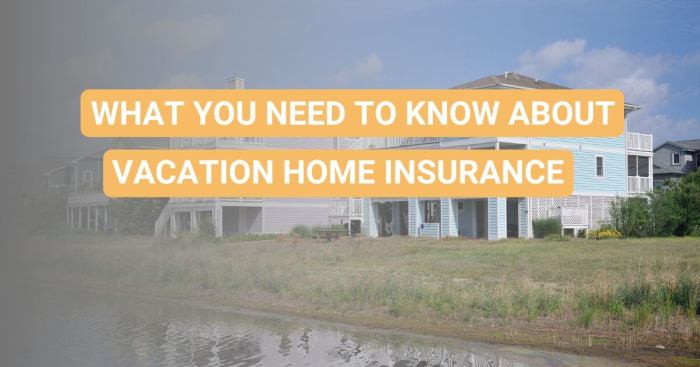Home insurance for a vacation home is crucial for safeguarding your investment and providing peace of mind. Explore the intricacies of insurance coverage tailored specifically for vacation properties in this comprehensive guide.
Importance of Home Insurance for a Vacation Home

Owning a vacation home is a dream come true for many individuals, offering a peaceful retreat and a place to create lasting memories. However, it is crucial to recognize the importance of having proper insurance coverage for your vacation property to protect your investment and provide peace of mind.
Home insurance for a vacation home differs from primary residence insurance in several ways. While both policies offer protection against common perils such as fire, theft, and liability claims, vacation home insurance takes into account the unique risks associated with properties that are not occupied year-round. These policies may include coverage for vandalism, damage caused by guests, and protection against loss of rental income.
Specific Risks for Vacation Homes, Home insurance for a vacation home
- Weather-related damage: Vacation homes are often located in areas prone to severe weather conditions such as hurricanes, floods, or wildfires. Insurance can help cover the costs of repairs or rebuilding in case of damage.
- Long periods of vacancy: Vacation properties are frequently unoccupied for extended periods, making them more susceptible to break-ins, vandalism, or undetected maintenance issues. Insurance can provide coverage for these risks.
- Rental liabilities: If you rent out your vacation home to guests, you may face additional risks such as property damage, accidents, or legal claims. Insurance can offer protection in case of these unforeseen events.
Types of Coverage Available

When it comes to insuring your vacation home, there are several types of coverage options to consider. Understanding the differences between basic coverage and comprehensive coverage, as well as the importance of additional coverage options like flood insurance and liability coverage, can help you make an informed decision to protect your investment.
Basic Coverage vs. Comprehensive Coverage
- Basic Coverage: Typically includes coverage for the structure of the home, personal property, and liability protection. This type of coverage may have limitations on specific perils covered and may not provide as much protection as comprehensive coverage.
- Comprehensive Coverage: Offers broader protection by including coverage for a wider range of perils, such as natural disasters, theft, and vandalism. This type of coverage may also include additional living expenses if your vacation home becomes uninhabitable.
Additional Coverage Options
- Flood Insurance: If your vacation home is located in a flood-prone area, it is essential to consider purchasing flood insurance as it is not typically covered under a standard homeowners policy.
- Liability Coverage: Provides protection in the event someone is injured on your property or if you are found liable for damages or injuries caused to others. This coverage can help cover legal expenses and medical bills.
Factors Influencing Premiums: Home Insurance For A Vacation Home

When it comes to vacation home insurance, there are several factors that insurance companies take into consideration when determining premiums. These factors can impact the cost of your insurance coverage and it’s important to understand how they influence the premiums you pay.
Location
The location of your vacation home plays a significant role in determining the insurance premium. Homes located in areas prone to natural disasters such as hurricanes, floods, or wildfires may have higher premiums due to the increased risk of damage. Additionally, homes in areas with high crime rates may also face higher insurance costs.
Property Type
The type of property you own can also impact your insurance premiums. Different types of homes, such as single-family houses, condos, or townhouses, may have varying insurance costs. The age and condition of the property, as well as any unique features like a pool or detached garage, can also affect the premium.
Security Features
Insurance companies often take into account the security features of your vacation home when calculating premiums. Homes with security systems, deadbolts, smoke detectors, and other safety measures may be eligible for discounts on insurance premiums. Improving the security of your property can help lower your insurance costs.
Usage Frequency
The frequency with which you use your vacation home can impact insurance premiums. If your property is left unoccupied for long periods, it may be at a higher risk of damage or vandalism. Insurance companies may charge higher premiums for homes that are not regularly occupied. Providing proof of regular maintenance and security checks can help lower insurance costs.
Tips for Choosing the Right Policy
When it comes to selecting the right insurance policy for your vacation home, there are several important factors to consider. From coverage options to policy exclusions, making an informed decision is crucial to protecting your investment.
Review Coverage Options Carefully
- Consider the specific needs of your vacation home, such as location, size, and amenities, when choosing coverage options.
- Look for policies that offer protection against common risks like natural disasters, theft, and liability claims.
- Consider additional coverage options like flood insurance or coverage for detached structures on your property.
Understand Policy Exclusions
- Read the fine print of your policy carefully to understand what is covered and what is not.
- Pay attention to exclusions such as damage from certain events or inadequate maintenance of the property.
- If you have any questions about policy exclusions, don’t hesitate to ask your insurer for clarification.
Work with Reputable Insurers Specializing in Vacation Home Coverage
- Choose an insurer with experience in providing coverage for vacation homes, as they will be familiar with the unique risks associated with these properties.
- Research the reputation of the insurer and read reviews from other policyholders to ensure they have a good track record of customer service and claims handling.
- Consider getting quotes from multiple insurers to compare coverage options and premiums before making a final decision.
In conclusion, securing the right insurance policy for your vacation home is paramount to protect against unforeseen circumstances and liabilities. By understanding the nuances of coverage options and premium factors, you can make informed decisions to safeguard your property effectively.
When it comes to elevating your home décor, rugs play a crucial role in transforming spaces. By strategically placing stylish rugs, you can add a touch of elegance and warmth to any room. Learn more about how to use rugs to elevate your home décor and create a welcoming atmosphere that reflects your personal style.
Enhance your indoor space with the natural beauty of houseplants. These green additions not only bring life to your home but also purify the air and create a calming environment. Discover the best houseplants for indoor home décor that will enhance your space and improve your overall well-being.
For a cozy and inviting atmosphere, trendy throw blankets are a must-have accessory. Whether you’re curling up on the couch or adding an extra layer of warmth to your bed, stylish blankets can elevate the comfort level of any space. Explore the latest trends in throw blankets for cozy spaces and bring ultimate comfort to your home.




